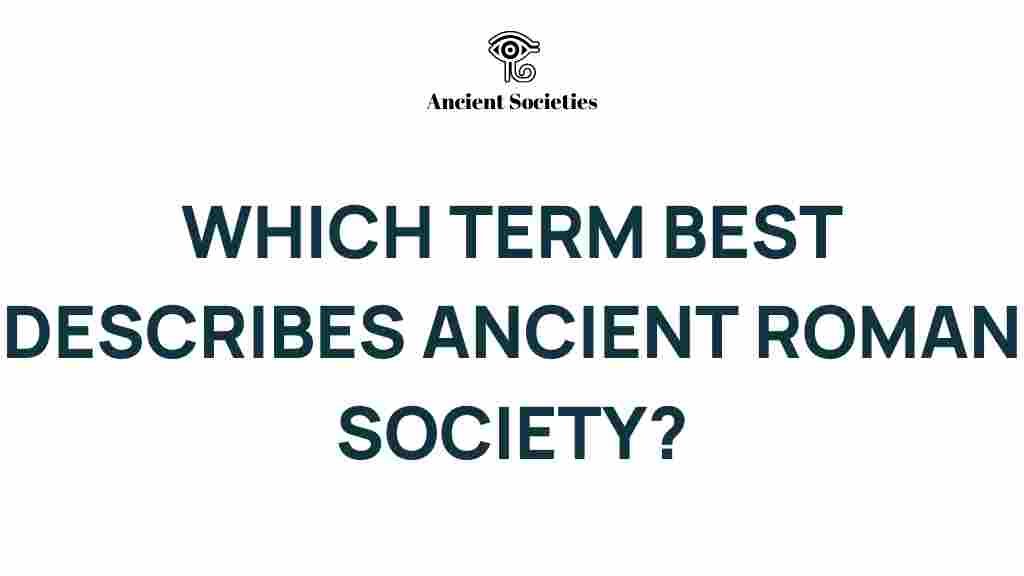Unraveling Ancient Rome: Society, Culture, and Its Legacy
The legacy of Ancient Rome is one of the most profound in human history, shaping the modern world in countless ways. The rich tapestry of Roman society and its intricate social structure have left an indelible mark on our cultures, politics, and daily lives. This article delves deep into the elements that define Ancient Roman civilization, exploring its history, culture, and the social dynamics that characterized one of the greatest empires of all time.
The Foundation of Roman Society
To understand the legacy of Ancient Rome, we must first explore the foundations of its society. At the heart of this civilization was a complex system of governance, family structures, and class divisions that shaped the daily lives of its citizens.
- Patricians and Plebeians: The Roman social structure was primarily divided into two classes: the patricians, the wealthy elite, and the plebeians, the common people. This division influenced politics and wealth distribution.
- Role of the Family: The family unit, or familia, was central to Roman life, with the paterfamilias (the male head) holding significant authority.
- Religion: Religion played a crucial role in Roman society, with various deities and rituals shaping cultural practices and social norms.
The Political Landscape of Ancient Rome
The politics of Ancient Rome were equally pivotal in defining its legacy. The evolution from a monarchy to a republic and ultimately an empire showcases a dynamic political environment.
- The Roman Republic: Established in 509 BC, it was marked by a system of checks and balances, with elected officials such as consuls and senators.
- Transition to Empire: The shift from republic to empire began with Julius Caesar and culminated in Augustus becoming the first emperor, fundamentally altering Roman governance.
Daily Life in Ancient Rome
Understanding the daily life of Romans provides insight into their culture and societal dynamics. Life in Ancient Rome varied greatly depending on one’s social status.
- Housing: Patricians lived in luxurious domus, while plebeians often resided in crowded apartment complexes called insulae.
- Food: The diet was diverse, with staples such as bread, olives, and wine, reflecting the agricultural practices of the empire.
- Entertainment: Public spectacles like gladiator games and chariot races were integral to Roman culture, serving both as entertainment and a means of social control.
Culture and Arts: The Roman Influence
The cultural achievements of Ancient Rome are vast, influencing art, architecture, literature, and philosophy.
- Architecture: Romans excelled in engineering and construction, creating iconic structures such as the Colosseum, aqueducts, and roads that facilitated commerce and military movement.
- Literature: Figures like Virgil and Ovid contributed to a rich literary tradition that explored themes of heroism, love, and politics.
- Philosophy: Stoicism and Epicureanism were significant philosophical movements in Rome, shaping ethical thought and personal conduct.
The Role of Women in Roman Society
Women in Ancient Rome held a complex position within the social structure. While their rights were limited compared to men, they played vital roles in family and society.
- Legal Status: Women could own property and manage businesses, but they were under the authority of their fathers or husbands.
- Social Influence: Women like Livia, the wife of Augustus, wielded considerable influence behind the scenes.
Religion and Its Impact on Society
Religious beliefs and practices were deeply intertwined with the political and social fabric of Ancient Rome.
- Polytheism: Romans worshipped a multitude of gods and goddesses, each representing different aspects of life and nature.
- State Religion: The state played a crucial role in religion, with emperors often deified, merging political power with divine authority.
- Rise of Christianity: In the later stages of the empire, Christianity emerged as a significant force, eventually leading to profound changes in Roman society.
Challenges and Decline of the Roman Empire
The decline of the Roman Empire was a complex process influenced by various internal and external factors.
- Economic Troubles: Heavy taxation, reliance on slave labor, and inflation weakened the economy.
- Military Issues: Continuous invasions by barbarian tribes and internal strife led to military decline.
- Political Corruption: Ineffective leadership and political instability plagued the latter years of the empire.
Roman Legacy in the Modern World
The legacy of Ancient Rome is evident in numerous aspects of modern life. Its influence can be seen in:
- Government: Concepts of republicanism, legal systems, and governance models are derived from Roman principles.
- Language: Latin, the language of Rome, has influenced many modern languages and is the basis for legal and scientific terminology.
- Architecture: Roman architectural styles continue to inspire modern design, particularly in civic buildings and monuments.
Conclusion: The Enduring Influence of Roman Society
In conclusion, the society, culture, and history of Ancient Rome have left an enduring legacy that continues to shape our world today. From its sophisticated political systems to its rich cultural achievements, the Roman civilization offers valuable lessons and insights into human society. The complexities of its social structure, daily life, and politics provide a fascinating framework for understanding our own lives and societies. To learn more about the intricacies of ancient civilizations, visit this resource.
As we unravel the threads of Ancient Roman society, we see how its legacy resonates through time, reminding us of the achievements and challenges of one of history’s greatest empires.
This article is in the category History and created by AncientSocieties Team
